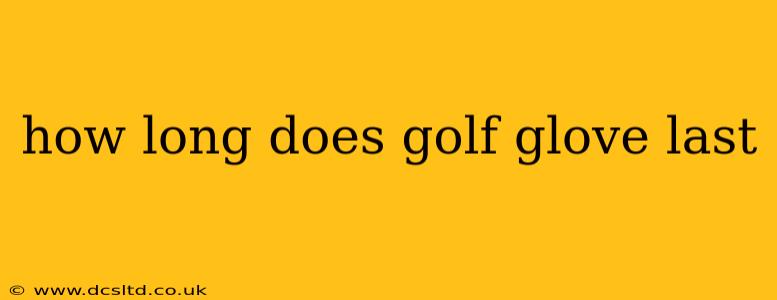Choosing the right golf glove is crucial for a comfortable and confident game. But how long should you expect your trusty glove to perform at its best? The lifespan of a golf glove isn't a fixed number; it depends on several factors, and understanding these will help you get the most out of your investment. This guide will explore the typical lifespan, factors affecting durability, and signs that it's time for a replacement.
How Long Does a Golf Glove Typically Last?
Generally, a high-quality golf glove will last between 3 and 6 months of regular play. However, this is just an average. Some golfers may find their glove worn out after just a few weeks, while others can extend the life to several months. This variance comes down to a number of variables discussed in detail below.
What Factors Affect the Lifespan of a Golf Glove?
Several factors significantly impact how long your golf glove survives. Understanding these will help you better predict when you need a new one and potentially prolong its life.
Frequency of Use:
The more often you play golf, the faster your glove will wear down. Daily players will naturally go through gloves faster than those who play only once a month.
Climate and Weather Conditions:
Harsh weather conditions like excessive sun, rain, and humidity can drastically shorten a glove's lifespan. Sun exposure causes leather to dry out and crack, while rain and humidity lead to accelerated wear and tear.
Material:
The type of material used in the glove significantly affects its durability. Cabretta leather gloves, known for their superior feel and grip, tend to last longer than synthetic leather or other materials. However, they also require more care. Synthetic gloves are often more affordable and easier to clean, but may not be as durable in the long run.
Hand Sweat:
Excessive hand sweat can degrade the leather or synthetic material quicker. This is especially true for cabretta leather, which can become stiff and brittle if not properly cared for.
Proper Care and Maintenance:
Proper care significantly impacts the longevity of your golf glove. Regularly cleaning and conditioning your glove can help prevent premature wear and tear.
Washing your glove:
Cleaning your golf glove helps maintain its quality and extend its life. Avoid using harsh detergents or machine washing, which can damage the material. Instead, gently wipe down your glove with a damp cloth after each use. Occasionally, a specialized leather cleaner can be used according to the instructions.
Conditioning your glove:
Leather gloves benefit from regular conditioning. This helps maintain its moisture levels and flexibility, preventing cracking and premature wear. Use a golf glove conditioner that is designed for the material of your glove. Always apply the conditioner sparingly and allow it to soak in fully.
Signs It's Time for a New Golf Glove
Several clear indicators tell you it's time to retire your old glove:
- Ripped or Torn Leather/Material: Any rips or tears significantly compromise the glove's grip and protection.
- Excessive Wear and Thinning: If the glove is noticeably thin or worn down, particularly in areas of high contact, it's likely lost its effectiveness.
- Loss of Grip: A worn-out glove will offer a poor grip, leading to a less confident swing and potentially affecting accuracy.
- Stiffness and Discomfort: A stiff or uncomfortable glove indicates that it has lost its flexibility and may not be providing adequate protection or comfort.
How to Prolong the Life of Your Golf Glove
- Rotate Gloves: Using multiple gloves extends the life of each.
- Air Out Your Gloves: Allowing your glove to air out after use prevents the build up of moisture.
- Use Glove Savers: Keeping your glove in a glove saver helps maintain its shape and protects it from damage.
- Store Properly: Store your gloves in a cool, dry place away from direct sunlight.
By understanding these factors and taking appropriate care, you can maximize the lifespan of your golf glove and keep your game on point. Remember, investing in a quality glove is a worthwhile investment for any serious golfer.
